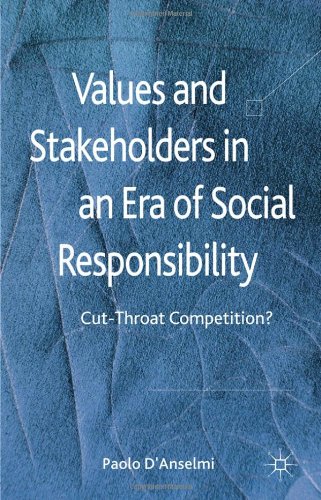

Most ebook files are in PDF format, so you can easily read them using various software such as Foxit Reader or directly on the Google Chrome browser.
Some ebook files are released by publishers in other formats such as .awz, .mobi, .epub, .fb2, etc. You may need to install specific software to read these formats on mobile/PC, such as Calibre.
Please read the tutorial at this link: https://ebookbell.com/faq
We offer FREE conversion to the popular formats you request; however, this may take some time. Therefore, right after payment, please email us, and we will try to provide the service as quickly as possible.
For some exceptional file formats or broken links (if any), please refrain from opening any disputes. Instead, email us first, and we will try to assist within a maximum of 6 hours.
EbookBell Team

5.0
110 reviews
ISBN 10: 0230303730
ISBN 13: 978-0230303737
Author: D'Anselmi
Assuming a pro-business viewpoint, this book criticizes sustainability and responsibility as it appears in the reports of corporations. It launches an appeal to the representatives of SMEs around the world to make accountability happen in government organizations and monopolies.
PART I: DEVELOPING A CSR PROCESS FRAMEWORK
1 The Backstage of Capitalism
Linux? Microsoft ignores it
The external effects of McDonald's
BAe Systems' weapons
Total's Club Med
Nike: disclosure and diversity
The yoke of Fiat
Holcim's breathing cement
Monnalisa's caring for China
Novartis and Médecins Sans Frontières
Sanofi Aventis for Africa?
The ethics governance of Siemens
Conclusion
2 CSR Is Who You Are (It's Not What You Do)
CSR is not philanthropy
Living on the margins
The four noble truths of CSR
Topology of responsibility
Not against thieves
A ‘weak' theory of CSR
3 Think Negative
Subway blues
Is there CSR outside Porter and Kramer?
CSR doppelgänger: irresponsibility
Kristijan Krkac's concept of 'Lying by Default'
The anesthetic of positive reporting
4 The USDIME Framework
Irresponsibility is important
The Figure in the Carpet: deriving a framework from the database
5 The Unknown Stakeholder
Questioning the stakeholder approach
Taxonomy of organizational sectors
In praise of competition
Highway system
Gas station owner-operators
Monopolist air carrier
Closed-shop recruitment by political parties
Germs of competition
The value of the unknown stakeholder
Questionnaire tool box
6 Disclosure
Relevance
Brevity
Doubt and vulnerability
Regional electoral communication
The European Central Bank
ICT pundits
7 Implementation
Key performance indicators
An enthusiasm for technicalities
Intangibles and externalities
Memory and time
From strategy to tactics
Citizen security system
We have met the enemy, and he is us
8 Everyman's Decision-Making: Micro-Ethics
The organizational model
IBM
The European Central Bank
More on the media
Ethics revealed
Ostrich ethics
Conclusion
9 Who's Afraid of the Policy Analyst?
The sorrows of the young CSR executive
The USDIME framework, CSR standards, and integrated reporting
10 The Proof of the Pudding: Applying the USDIME Framework
Finding what was expected by the corporation
Finding what was expected by the values
Towards an open source community of CSR rating
Conclusion
USDIME Framework Course Work
PART II: FROM CSR TO POLITICS: THE COMPETITIVE DIVIDE
11 The Neighborhood Bullies
The consumer and the telephone monopolist
The irresponsibility of the freeway company
The irresponsibility of banks
The power company report
The unbearable communication of the water company
Reforming paternalism in the media
The railways company
The name of the euro: the National Central Bank
Conclusion
Case study: applying the USDIME to a sample of European banks
12 The Profits of Non-Profit
Philanthropy does not mean responsibility
The Jesuits' accountability
The American Cancer Society: no need for indicators
Professor Jeffrey Sachs' recipe for international aid
The Vatican's accountability: the Devil's tail
Accounting for the industrialists' association
Case study: a comparative analysis of research institutions
13 The Autarky of Public Administration
Turning back the brain drain
The accounts of the courts
Shylock industrial policy
Dirigistic milk pricing
Micro health services
Public sector accounts
Case study: reverse engineering in the police force accounts
14 Irrelevant Politics
Supra-national bodies
Primary elections
Budgetary shortcuts
The value of politics
Case study: if you do not measure it, you did not do it
15 Four Fruitful Generalizations: From CSR to Politics
The cases on CSR are actually an analysis in the domain of work
Work evasion exists
Work evasion is pandemic
Case study: the prevalence of competition in society
There is a competitive divide among workers
The competitive divide partially explains the contemporary social malaise
From CSR to politics: interdisciplinary work and anti-politics
Stakeholders of what? The cost of non-government
'Communicating vessels'
16 What Is To Be Done? Developing a Political Agenda for Small and Medium-Sized Enterprises
The ghost of competition
Partitioning the workforce
Small is not beautiful, but it is useful
The status of SMEs in the political arena
SMEs as collective actors and full-field economic and social stakeholders
Global professional support for sustainability
A European Project
A CSR framework for individual SMEs
An inter-cultural perspective on economic and social competition
Values and Stakeholders: separating the beautiful from the useful
values of stakeholders
values impact stakeholders. share some examples
values and ethical standards
stakeholders and values
stakeholder values examples